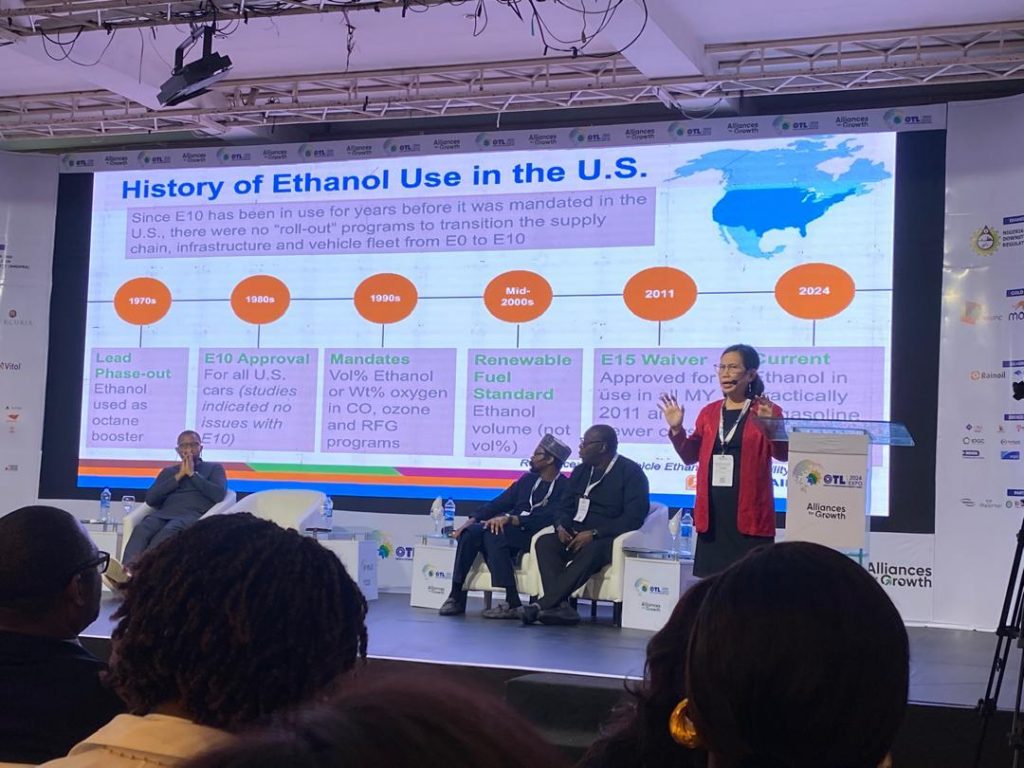A U.S. Grains Council (USGC) delegation engaged stakeholders in the downstream sector of the Nigerian oil industry on the benefits of bioethanol during the 18th Oil Trading and Logistics (OTL) Africa Downstream Energy Week held in Lagos, Nigeria.
The Council was represented by Global Ethanol Technical Consultant and Advisor Rowena Torres-Ordonez and Middle East and Africa Regional Ethanol Consultant Gbenga Apampa, who both continued the Council’s advocacy for a 10 percent ethanol blending (E10) mandate implementation during the week-long event.
The OTL conference is Africa’s leading energy industry event attracting international policymakers, regulators, consumers, service providers and others. The event covered an array of topics including supply chain flows and pricing, shipping logistics and renewable energy developments including biofuels.
Torres-Ordonez gave a presentation on the history of global fuel ethanol use and the financial, human health and environmental benefits of blending ethanol into gasoline for on-road vehicles. She explained how ethanol blending can help Nigeria work towards net-zero emissions while improving its agricultural economy and well as provide flexibility to refiners and gasoline retailers.
“Africa is rapidly developing and modernizing, meaning consumer demand for fuel and electricity is on the rise,” Torres-Ordonez said.
“While traditional energy sources like oil are by far the most widely used on the continent, this event clearly showed policymakers and industry officials that biofuels offer improved affordability and sustainability, and the Council is ready to support African markets in their energy growth and emissions reduction with bioethanol.”
With the assistance of Major Energy Marketers Association of Nigeria (MEMAN), Apampa and Torres-Ordonez participated in roundtable discussions with representatives of government regulators, the Lagos State Government and other industry stakeholders at side-events to the OTL Conference. This effort continued building coalitions to enhance biofuel adoption in a variety of sectors including engaging with the Cassava Growers Association.
The Council’s delegation also visited Dangote Refinery to further discuss technical and international pricing considerations for a first purchase of U.S. ethanol. Dangote Refinery is Africa’s largest refinery and the world’s largest single train refinery. The refinery began producing gasoline on Sept. 3 and has requested more technical information on bioethanol blending, handling and transportation from the Council.
The Council’s group also met with U.S. Department of Agriculture Foreign Agriculture Service (USDA FAS) Agricultural Counselor Christopher Bielecki, at the U.S. Consulate General to learn how the Council can support FAS in its goals in Africa.
Learn more about the Council’s work in ethanol here.
About The U.S. Grains Council
The U.S. Grains Council develops export markets for U.S. barley, corn, sorghum and related products including distiller’s dried grains with solubles (DDGS) and ethanol. With full-time presence in 28 locations, the Council operates programs in more than 50 countries and the European Union. The Council believes exports are vital to global economic development and to U.S. agriculture’s profitability. Detailed information about the Council and its programs is online at www.grains.org.

